

Recent Books
Protectors or Pretenders:
Government Human Rights Commissions in Africa
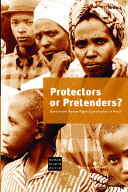 State-sponsored
national human rights commissions have become a new vogue among governments,
particularly in Africa, over the past decade. While many human rights activists
view this trend with skepticism, the United Nations High Commissioner for
Human Rights and donor governments are actively championing these institutions
as a manifest contribution to human rights. The proliferation of these
commissions, many formed by repressive governments, poses something of
a dilemma for human rights activists who are more accustomed to challenging
the state on rights issues than collaborating with it. The question is:
are such state- sponsored human rights bodies to be regarded with suspicion
or should their development be encouraged? This report examines how, and
whether, the commissions set up by African governments are contributing
towards the protection of human rights. Our findings provide an opportunity
for governments, the United Nations, and donors, to take stock, and where
appropriate, to be more circumspect about their unquestioning enthusiasm
for these bodies.
State-sponsored
national human rights commissions have become a new vogue among governments,
particularly in Africa, over the past decade. While many human rights activists
view this trend with skepticism, the United Nations High Commissioner for
Human Rights and donor governments are actively championing these institutions
as a manifest contribution to human rights. The proliferation of these
commissions, many formed by repressive governments, poses something of
a dilemma for human rights activists who are more accustomed to challenging
the state on rights issues than collaborating with it. The question is:
are such state- sponsored human rights bodies to be regarded with suspicion
or should their development be encouraged? This report examines how, and
whether, the commissions set up by African governments are contributing
towards the protection of human rights. Our findings provide an opportunity
for governments, the United Nations, and donors, to take stock, and where
appropriate, to be more circumspect about their unquestioning enthusiasm
for these bodies.
(2556), 01/01, 428pp., ISBN 1-56432-255-6
$25.00
Order online: http://store.yahoo.com/hrwpubs/protorpretgo.html
The “Sixth Division”
Military-paramilitary Ties and U.S. Policy in Colombia
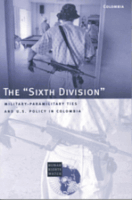 The
“Sixth Division” is a phrase used in Colombia to refer to paramilitary
groups. These groups are responsible for most human rights violations,
including massacres and forced displacement. Both paramilitaries and leftist
guerrillas primarily target civilians, meaning that terror has become a
way of life for many. Colombians who have documented abuses have been threatened,
killed, and forced to leave Colombia for their safety. This report presents
detailed evidence on how Colombian army brigades and police work with and
even profit from paramilitaries, treating them as a force allied with their
own. Some government officials denounce paramilitaries and have arrested
them. But overall, Colombia’s government has not taken effective measures
to break links between the military and paramilitaries. The Sixth Division
also describes how American policy makers have failed to enforce U.S. human
rights law, ensuring that the Colombian military will continue to receive
security assistance despite its poor record.
The
“Sixth Division” is a phrase used in Colombia to refer to paramilitary
groups. These groups are responsible for most human rights violations,
including massacres and forced displacement. Both paramilitaries and leftist
guerrillas primarily target civilians, meaning that terror has become a
way of life for many. Colombians who have documented abuses have been threatened,
killed, and forced to leave Colombia for their safety. This report presents
detailed evidence on how Colombian army brigades and police work with and
even profit from paramilitaries, treating them as a force allied with their
own. Some government officials denounce paramilitaries and have arrested
them. But overall, Colombia’s government has not taken effective measures
to break links between the military and paramilitaries. The Sixth Division
also describes how American policy makers have failed to enforce U.S. human
rights law, ensuring that the Colombian military will continue to receive
security assistance despite its poor record.
(2653), 08/01, 144 pp., ISBN 1-56432-265-3,
$ 15.00
Order online: http://store.yahoo.com/hrwpubs/sixdivmilpar.html
Second Class
Discrimination Against Palestinian Arab
Children in Israel’s Schools
 Nearly
one in four of Israel’s 1.6 million schoolchildren are educated in a public
school system wholly separate from the majority. These children are Palestinian
Arab citizens of Israel. A world apart in quality from the public schools
serving Israel’s majority Jewish population, schools for Palestinian Arab
children offer fewer facilities and educational opportunities than are
offered other Israeli children. Palestinian Arab children attend schools
with larger classes and fewer teachers than do those in the Jewish school
sys-tem, with some children having to travel long distances to reach the
nearest school. Some Arab schools lack basic learning facilities like libraries,
computers, science laboratories, and recreation space. Palestinian Arab
children with disabilities are particularly marginalized. Palestinian Arab
students drop out of school at three times the rate of Jewish students
and are less likely to pass the national exams common to the two systems
for a high school diploma. Only a handful make it to university. Among
Palestinian Arabs, the Negev Bedouin fare the worst in every respect. Israeli
government authorities have acknowledged the gaps between Arab and Jewish
education but have failed to equalize the two systems. This report documents
Israel’s discrimination against its Palestinian Arab children in guaranteeing
the right to education-and obstacles to overcome if Israel is to close
the gap.
Nearly
one in four of Israel’s 1.6 million schoolchildren are educated in a public
school system wholly separate from the majority. These children are Palestinian
Arab citizens of Israel. A world apart in quality from the public schools
serving Israel’s majority Jewish population, schools for Palestinian Arab
children offer fewer facilities and educational opportunities than are
offered other Israeli children. Palestinian Arab children attend schools
with larger classes and fewer teachers than do those in the Jewish school
sys-tem, with some children having to travel long distances to reach the
nearest school. Some Arab schools lack basic learning facilities like libraries,
computers, science laboratories, and recreation space. Palestinian Arab
children with disabilities are particularly marginalized. Palestinian Arab
students drop out of school at three times the rate of Jewish students
and are less likely to pass the national exams common to the two systems
for a high school diploma. Only a handful make it to university. Among
Palestinian Arabs, the Negev Bedouin fare the worst in every respect. Israeli
government authorities have acknowledged the gaps between Arab and Jewish
education but have failed to equalize the two systems. This report documents
Israel’s discrimination against its Palestinian Arab children in guaranteeing
the right to education-and obstacles to overcome if Israel is to close
the gap.
(2661), 09/01, 208 pp.,ISBN 1-56432-266-1,
$15.00
Order online: http://store.yahoo.com/hrwpubs/secclasdisag.html
Center of the Storm:
A Case Study of Human Rights Abuses
in Hebron District
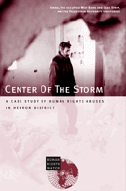 For
the past six months, the West Bank city of Hebron has been the scene of
serious and sustained human rights abuses, Human Rights Watch said in a
new report released today. The eighty-two page report, Center of the Storm:
A Case Study of Human Rights Abuses in Hebron District, documents excessive
use of force and unlawful killings by Israeli forces, Palestinian targeting
of Israeli civilians, and a systematic policy of Israeli blockades and
curfews that amount to collective punishment. The report also brings to
light a disturbing pattern of violence committed by Jewish settlers against
Palestinian civilians in and around Hebron, often committed with the knowledge
of Israeli Defense Force (IDF) soldiers in the area.Human Rights Watch
urged the Israeli government and the Palestinian Authority take immediate
steps to stop abuses by the forces under their control, and called for
an independent, international monitoring presence in the West Bank and
Gaza Strip to monitor and report on Israeli and Palestinian abuses. Human
Rights Watch researchers spent a total of five weeks in Hebron in November
2000 and February 2001. They completed more than 180 interviews with victims
and witnesses to abuses, Israeli and Palestinian officials, international
observers, medical and educational personnel, and Israeli settler representatives.
For
the past six months, the West Bank city of Hebron has been the scene of
serious and sustained human rights abuses, Human Rights Watch said in a
new report released today. The eighty-two page report, Center of the Storm:
A Case Study of Human Rights Abuses in Hebron District, documents excessive
use of force and unlawful killings by Israeli forces, Palestinian targeting
of Israeli civilians, and a systematic policy of Israeli blockades and
curfews that amount to collective punishment. The report also brings to
light a disturbing pattern of violence committed by Jewish settlers against
Palestinian civilians in and around Hebron, often committed with the knowledge
of Israeli Defense Force (IDF) soldiers in the area.Human Rights Watch
urged the Israeli government and the Palestinian Authority take immediate
steps to stop abuses by the forces under their control, and called for
an independent, international monitoring presence in the West Bank and
Gaza Strip to monitor and report on Israeli and Palestinian abuses. Human
Rights Watch researchers spent a total of five weeks in Hebron in November
2000 and February 2001. They completed more than 180 interviews with victims
and witnesses to abuses, Israeli and Palestinian officials, international
observers, medical and educational personnel, and Israeli settler representatives.
(2602),04/01,176pp, ISBN 1-56432-255-6
$15.00
Order online http://store.yahoo.com/hrwpubs/cenofstorcas.html
Owed Justice:
Thai Women Trafficked into Debt Bondage
in Japan
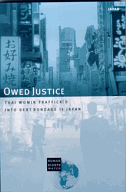 Thousands
of Thai women are "trafficked" every year into Japan, where many of them
endure slavery-like conditions in the Japanese sex industry, Human Rights
Watch said in a this new report. According to the 227-page report, "Owed
Justice: Thai Women Trafficked into Debt Bondage in Japan," the women are
typically promised lucrative jobs by traffickers in Thailand, but arrive
in Japan to find themselves trapped in "debt." To repay these exorbitant
sums - usually US$25,000 to US$40,000 - they must work for months, or even
years, without pay, under highly coercive and abusive conditions. Japanese
officials have publicly expressed their concern for the victims of trafficking.
But over the course of a six-year investigation in both Japan and Thailand,
Human Rights Watch found that the Japanese government has taken no concrete
steps to stamp out the practice.The report notes that both the Japanese
and Thai governments are participating in the drafting of a United Nations
anti-trafficking protocol that will influence governments' response to
trafficking in persons worldwide. The negotiations resume next month, and
Human Rights Watch calls on the Japanese and Thai governments, as well
as all other participating states, to ensure that the protocol includes
strong provisions for the protection of the human rights and physical safety
of trafficking victims.
Thousands
of Thai women are "trafficked" every year into Japan, where many of them
endure slavery-like conditions in the Japanese sex industry, Human Rights
Watch said in a this new report. According to the 227-page report, "Owed
Justice: Thai Women Trafficked into Debt Bondage in Japan," the women are
typically promised lucrative jobs by traffickers in Thailand, but arrive
in Japan to find themselves trapped in "debt." To repay these exorbitant
sums - usually US$25,000 to US$40,000 - they must work for months, or even
years, without pay, under highly coercive and abusive conditions. Japanese
officials have publicly expressed their concern for the victims of trafficking.
But over the course of a six-year investigation in both Japan and Thailand,
Human Rights Watch found that the Japanese government has taken no concrete
steps to stamp out the practice.The report notes that both the Japanese
and Thai governments are participating in the drafting of a United Nations
anti-trafficking protocol that will influence governments' response to
trafficking in persons worldwide. The negotiations resume next month, and
Human Rights Watch calls on the Japanese and Thai governments, as well
as all other participating states, to ensure that the protocol includes
strong provisions for the protection of the human rights and physical safety
of trafficking victims.
(2521) 9/00, 228pp., ISBN 1-56432-252-1
$15.00
Order online http://store.yahoo.com/hrwpubs/owjusthawomt.html
Under Orders
War Crimes in Kosovo
 This
report documents the murders, rapes, forced expulsions, and other war crimes
committed by Serbian and Yugoslav government forces against Kosovar Albanians
between March 24 and June 12, 1999, the period of NATO’s air campaign against
Yugoslavia. The report documents a coordinated and systematic campaign
to terrorize, kill, and expel the ethnic Albanians of Kosovo that was organized
by the highest levels of the Serbian and Yugoslav governments in power
at that time. The report also describes serious abuses committed by the
Kosovo Liberation Army, which abducted and murdered civilians during and
after the war, as well as by NATO, which failed to adequately mini-mize
civilian casualties during its bombing of Yugoslavia. The primary focus,
however, is the Serbian and Yugoslav state-sponsored violence inflicted
against ethnic Albanian citizens of Yugoslavia.
This
report documents the murders, rapes, forced expulsions, and other war crimes
committed by Serbian and Yugoslav government forces against Kosovar Albanians
between March 24 and June 12, 1999, the period of NATO’s air campaign against
Yugoslavia. The report documents a coordinated and systematic campaign
to terrorize, kill, and expel the ethnic Albanians of Kosovo that was organized
by the highest levels of the Serbian and Yugoslav governments in power
at that time. The report also describes serious abuses committed by the
Kosovo Liberation Army, which abducted and murdered civilians during and
after the war, as well as by NATO, which failed to adequately mini-mize
civilian casualties during its bombing of Yugoslavia. The primary focus,
however, is the Serbian and Yugoslav state-sponsored violence inflicted
against ethnic Albanian citizens of Yugoslavia.
(2645), 10/01, 624 pp., ISBN 1-56432-264-5,
$40.00
Order online: http://store.yahoo.com/hrwpubs/unorwarcrimi.html
"Welcome to Hell":
Arbitrary Detention, Torture, and Extortion
in Chechnya
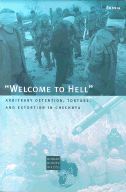 This
report details the cycle of torture and extortion faced by thousands of
Chechens whom Russian forces have detained in Chechnya. The rights group
called on European states to file a case against Russia in the European
Court of Human Rights, for these and other abuses during the war in Chechnya.
The 99-page report, entitled "Welcome to Hell," describes how Russian troops
have detained thousands of Chechens on suspicion of collaboration with
rebel fighters. Many of them were detained arbitrarily, with no evidence
of wrongdoing. Guards at detention centers systematically beat Chechen
detainees, some of whom have also been raped or subjected to other forms
of torture. Most were released only after their families managed to pay
large bribes to Russian officials. Russian authorities have launched no
credible and transparent effort to investigate these abuses and bring the
perpetrators to justice. "Welcome to hell" is how guards at the Chernokozovo
detention facility would greet detainees, before forcing them to undergo
a hail of blows by baton-wielding guards. Chechens who do not have proper
identity papers, who share a surname with a Chechen commander, who are
thought to have relatives who are fighters, or who simply "look" like fighters,
continue to be detained and abused on a daily basis in their communities
or at Chechnya's hundreds of checkpoints. Many "disappear" for months as
Russian officials keep them in incommunicado detention. Some are eventually
released when relatives pay a bribe. Others never come back.
This
report details the cycle of torture and extortion faced by thousands of
Chechens whom Russian forces have detained in Chechnya. The rights group
called on European states to file a case against Russia in the European
Court of Human Rights, for these and other abuses during the war in Chechnya.
The 99-page report, entitled "Welcome to Hell," describes how Russian troops
have detained thousands of Chechens on suspicion of collaboration with
rebel fighters. Many of them were detained arbitrarily, with no evidence
of wrongdoing. Guards at detention centers systematically beat Chechen
detainees, some of whom have also been raped or subjected to other forms
of torture. Most were released only after their families managed to pay
large bribes to Russian officials. Russian authorities have launched no
credible and transparent effort to investigate these abuses and bring the
perpetrators to justice. "Welcome to hell" is how guards at the Chernokozovo
detention facility would greet detainees, before forcing them to undergo
a hail of blows by baton-wielding guards. Chechens who do not have proper
identity papers, who share a surname with a Chechen commander, who are
thought to have relatives who are fighters, or who simply "look" like fighters,
continue to be detained and abused on a daily basis in their communities
or at Chechnya's hundreds of checkpoints. Many "disappear" for months as
Russian officials keep them in incommunicado detention. Some are eventually
released when relatives pay a bribe. Others never come back.
(253X), 10/00, 99pp., ISBN1-56432-253-X
$10.00
Order online: http://store.yahoo.com/hrwpubs/rustohelarde.html
Uprooting the Rural Poor in Rwanda
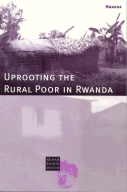 The
Rwandan government has resettled hundreds of thousands of Tutsi refugees
who came home after decades of exile, four years of war, and the 1994 genocide
that killed at least half a million Tutsi living inside Rwanda. This report
deals not with that resettlement, which has drawn general praise, but rather
with another, less well-known process which took place in its shadow and
which resulted in violations of the rights of tens of thousands of Rwandan
citizens. In 1996, the Rwandan Cabinet adopted a National Habitat Policy
dictating that all Rwandans living in scattered homesteads throughout the
country were to reside instead in government-created "villages" called
imidugudu. Established without any form of popular consultation or act
of parliament, this policy decreed a drastic change in the way of life
of approximately 94 percent of the population. In the subsequent four years,
the Rwandan government moved hundreds of thousands of citizens into imidugudu,
a significant number of them against their will. This report is based upon
field work in ten of the twelve prefectures of Rwanda (Butare, Byumba,Cyangugu,
Gisenyi, Gitarama, Kibungo, Kigali, Kigali-rural, Ruhengeri, and Umutara)
as well as on interviews with officials of the Rwandan government, staff
ofembassies in Kigali, and representatives of various international agencies
and nongovernmental organizations. It draws also on documents from the
Rwandan government, the United Nations, and diplomatic sources.
The
Rwandan government has resettled hundreds of thousands of Tutsi refugees
who came home after decades of exile, four years of war, and the 1994 genocide
that killed at least half a million Tutsi living inside Rwanda. This report
deals not with that resettlement, which has drawn general praise, but rather
with another, less well-known process which took place in its shadow and
which resulted in violations of the rights of tens of thousands of Rwandan
citizens. In 1996, the Rwandan Cabinet adopted a National Habitat Policy
dictating that all Rwandans living in scattered homesteads throughout the
country were to reside instead in government-created "villages" called
imidugudu. Established without any form of popular consultation or act
of parliament, this policy decreed a drastic change in the way of life
of approximately 94 percent of the population. In the subsequent four years,
the Rwandan government moved hundreds of thousands of citizens into imidugudu,
a significant number of them against their will. This report is based upon
field work in ten of the twelve prefectures of Rwanda (Butare, Byumba,Cyangugu,
Gisenyi, Gitarama, Kibungo, Kigali, Kigali-rural, Ruhengeri, and Umutara)
as well as on interviews with officials of the Rwandan government, staff
ofembassies in Kigali, and representatives of various international agencies
and nongovernmental organizations. It draws also on documents from the
Rwandan government, the United Nations, and diplomatic sources.
(2610), 06/01, 91pp,, ISBN 1-56432-261-0
$10.00
Order online:
http://store.yahoo.com/hrwpubs/rwanuprurpoo.html
Unequal Protection
The State Response to Violent Crime on South African Farms
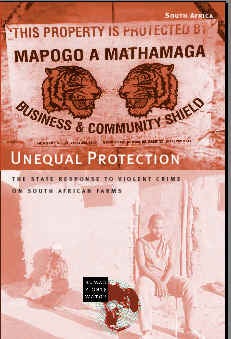 The
South African government is failing to adequately protect residents of
commercial farming areas from violent crime, Human Rights Watch charged
in a report released today. Black farm residents are most severely affected
by this failure, and black women are most vulnerable of all, Human Rights
Watch said. The 230- page report, Unequal Protection: The State Response
to Violent Crime on South African Farms, is being published in advance
of next week’s United Nations conference on racism, to be held in Durban.
It is based on research carried out by Human Rights Watch in rural areas
of South Africa during 2000. The state response to violent crime against
white farm owners and managers could and should be improved, Human Rights
Watch said, but black farm workers and their families have much more difficulty
getting help from the criminal justice system. In South Africa, where land
ownership was restricted to whites for most of the twentieth century, most
farm owners are still white, whereas farm-workers are mostly black. Since
the early 1990s, there has been a marked increase in assaults and murders
of the own-ers and managers of commercial farms and their families.
The
South African government is failing to adequately protect residents of
commercial farming areas from violent crime, Human Rights Watch charged
in a report released today. Black farm residents are most severely affected
by this failure, and black women are most vulnerable of all, Human Rights
Watch said. The 230- page report, Unequal Protection: The State Response
to Violent Crime on South African Farms, is being published in advance
of next week’s United Nations conference on racism, to be held in Durban.
It is based on research carried out by Human Rights Watch in rural areas
of South Africa during 2000. The state response to violent crime against
white farm owners and managers could and should be improved, Human Rights
Watch said, but black farm workers and their families have much more difficulty
getting help from the criminal justice system. In South Africa, where land
ownership was restricted to whites for most of the twentieth century, most
farm owners are still white, whereas farm-workers are mostly black. Since
the early 1990s, there has been a marked increase in assaults and murders
of the own-ers and managers of commercial farms and their families.
(2637), 08/01, 230pp, ISBN 1-56432-263-7,
$20.00
Order online: http://store.yahoo.com/hrwpubs/unprotstatre.html
Scared at School:
Sexual Violence Against Girls in South
African Schools
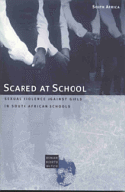 In
schools across South Africa, thousands of girls of every race and economic
group are encountering sexual violence and harassment that impede their
access to education, Human Rights Watch charged in a report released today.
School authorities rarely challenge the perpetrators, and many girls interrupt
their education or leave school altogether because they feel vulnerable
to sexual assault, Human Rights Watch said. This report is based on extensive
interviews with victims, their parents, teachers, and school administrators
in KwaZulu-Natal, Gauteng, and the Western Cape. It documents how girls
are raped, sexually abused, sexually harassed, and assaulted at school
by their male classmates and even by their teachers. According to the report,
girls have been attacked in school toilet facilities, in empty classrooms
and corridors, hostel rooms and dormitories. Teachers can misuse their
authority to sexually abuse girls, sometimes reinforcing sexual demands
with threats of corporal punishment or promises of better grades, or even
money. Human Rights Watch called on the South African government and its
National Department of Education to develop a national plan of action to
address the problem of school-based sexual violence, in broad cooperation
with students, parents, teachers, and school administrators.
In
schools across South Africa, thousands of girls of every race and economic
group are encountering sexual violence and harassment that impede their
access to education, Human Rights Watch charged in a report released today.
School authorities rarely challenge the perpetrators, and many girls interrupt
their education or leave school altogether because they feel vulnerable
to sexual assault, Human Rights Watch said. This report is based on extensive
interviews with victims, their parents, teachers, and school administrators
in KwaZulu-Natal, Gauteng, and the Western Cape. It documents how girls
are raped, sexually abused, sexually harassed, and assaulted at school
by their male classmates and even by their teachers. According to the report,
girls have been attacked in school toilet facilities, in empty classrooms
and corridors, hostel rooms and dormitories. Teachers can misuse their
authority to sexually abuse girls, sometimes reinforcing sexual demands
with threats of corporal punishment or promises of better grades, or even
money. Human Rights Watch called on the South African government and its
National Department of Education to develop a national plan of action to
address the problem of school-based sexual violence, in broad cooperation
with students, parents, teachers, and school administrators.
(2572), 03/01, 138pp,, ISBN 1-56432-257-2
$10.00
Order online
http://store.yahoo.com/hrwpubs/scaratschool.html
"Seeking Protection":
Addressing Sexual and Domestic Violence
in Tanzania's Refugee Camps
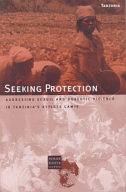 Burundian
refugee women confront daily violence in Tanzanian refugee camps,Human
Rights Watch charges in a new report released today. Wide-spread sexual
and domestic abuse have left many of these women physically battered, psychologically
traumatized, and fearful for their lives. Although the office of the United
Nations High Commissioner for Refugees (unhcr) has taken significant steps
to address this violence, the international monitoring organization states
that the measures are insufficient. The 151-page report, "Seeking Protection:
Addressing Sexual and Domestic Violence in Tanzania's Refugee Camps," documents
unhcr's and the Tanzanian host government's failure to address violence
against women refugees in a timely and effective manner, despite ample
evidence that women's lives were in danger in their homes and in the general
camp community.
Burundian
refugee women confront daily violence in Tanzanian refugee camps,Human
Rights Watch charges in a new report released today. Wide-spread sexual
and domestic abuse have left many of these women physically battered, psychologically
traumatized, and fearful for their lives. Although the office of the United
Nations High Commissioner for Refugees (unhcr) has taken significant steps
to address this violence, the international monitoring organization states
that the measures are insufficient. The 151-page report, "Seeking Protection:
Addressing Sexual and Domestic Violence in Tanzania's Refugee Camps," documents
unhcr's and the Tanzanian host government's failure to address violence
against women refugees in a timely and effective manner, despite ample
evidence that women's lives were in danger in their homes and in the general
camp community.
(2483), 10/00 151pp,, ISBN 1-56432-248-3
$10.00
Order online: http://store.yahoo.com/hrwpubs/seekadsexand.html
Hatred in The Hallways:
Violence & Discrimination Against
Lesbian, Gay, Bisexual, and Transgender Students in U.S. Schools
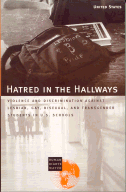 To
the more than two million lesbian, gay, bisexual, and transgender youth
of school age living in the United States and to those who are questioning
their sexual orientation or gender identity, Dylan N.'s story is all too
familiar. It is a story of harassment, abuse, and violence; a story of
deliberate indifference by school officials who disclaim any responsibility
for protecting Dylan or ensuring his right to an education; a story of
escalating violence; a story of the failure of legal protection; and finally,
a story of a young man denied an education because of his sexual orientation.
In this report, Human Rights Watch documents attacks on the human rights
of lesbian, gay, bisexual, and transgender youth who are subjected to abuse
on a daily basis by their peers and in some cases by teachers and school
administrators. These violations are compounded by the failure of federal,
state, and local governments to enact laws providing students with express
protection from discrimination and violence based on their sexual orientation
and gender identity, effectively allowing school officials to ignore violations
of these students' rights.
To
the more than two million lesbian, gay, bisexual, and transgender youth
of school age living in the United States and to those who are questioning
their sexual orientation or gender identity, Dylan N.'s story is all too
familiar. It is a story of harassment, abuse, and violence; a story of
deliberate indifference by school officials who disclaim any responsibility
for protecting Dylan or ensuring his right to an education; a story of
escalating violence; a story of the failure of legal protection; and finally,
a story of a young man denied an education because of his sexual orientation.
In this report, Human Rights Watch documents attacks on the human rights
of lesbian, gay, bisexual, and transgender youth who are subjected to abuse
on a daily basis by their peers and in some cases by teachers and school
administrators. These violations are compounded by the failure of federal,
state, and local governments to enact laws providing students with express
protection from discrimination and violence based on their sexual orientation
and gender identity, effectively allowing school officials to ignore violations
of these students' rights.
(2580), 05/01, 220pp,, ISBN 1-56432-2580
$20.00
Order online: http://store.yahoo.com/hrwpubs/hatinhal.html
No Escape:
Male Rape in U.S. Prisons
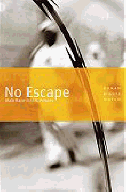 This
ground-breaking new report by Human Rights Watch charges that state authorities
are responsible for widespread prisoner-on-prisoner sexual abuse in U.S.
men's prisons. The 378-page report is based on more than three years of
research and is the first national survey of prisoner-on-prisoner rape.
There are some two million inmates in U.S. prisons and jails. Human Rights
Watch warned that by failing to implement reasonable measures to prevent
and punish rape and, indeed, in many cases, taking actions that make sexual
victimization likely state authorities permit this physically and psychologically
devastating abuse to occur. The group's findings are based on correspondence
with more than 200 prisoners spread among thirty-four states, inmate interviews,
and a comprehensive survey of state correctional authorities. Certain prisoners
are targeted for sexual exploitation the moment they enter a penal facility:
their age, looks, sexual preference, and other characteristics mark them
as candidates for abuse. Human Rights Watch's research revealed a broad
range of factors that correlate with increased vulnerability to rape. These
include youth, small size, and physical weakness; being white, gay, or
a first offender; possessing "feminine" characteristics such as long hair
or a high voice; being unassertive, unaggressive, shy, intellectual, not
street-smart, or "passive"; or having been convicted of a sexual offense
against a minor.
This
ground-breaking new report by Human Rights Watch charges that state authorities
are responsible for widespread prisoner-on-prisoner sexual abuse in U.S.
men's prisons. The 378-page report is based on more than three years of
research and is the first national survey of prisoner-on-prisoner rape.
There are some two million inmates in U.S. prisons and jails. Human Rights
Watch warned that by failing to implement reasonable measures to prevent
and punish rape and, indeed, in many cases, taking actions that make sexual
victimization likely state authorities permit this physically and psychologically
devastating abuse to occur. The group's findings are based on correspondence
with more than 200 prisoners spread among thirty-four states, inmate interviews,
and a comprehensive survey of state correctional authorities. Certain prisoners
are targeted for sexual exploitation the moment they enter a penal facility:
their age, looks, sexual preference, and other characteristics mark them
as candidates for abuse. Human Rights Watch's research revealed a broad
range of factors that correlate with increased vulnerability to rape. These
include youth, small size, and physical weakness; being white, gay, or
a first offender; possessing "feminine" characteristics such as long hair
or a high voice; being unassertive, unaggressive, shy, intellectual, not
street-smart, or "passive"; or having been convicted of a sexual offense
against a minor.
(2580), 04/01, 378pp, ISBN 1-56432-2580
$25.00
Order online: http://store.yahoo.com/hrwpubs/noesmalrapin.html
Unfair Advantage:
Workers' Freedom of Association in
the United States under International Human Rights Standards
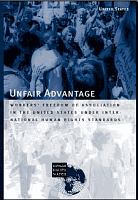 Workers'
basic rights are routinely violated in the United States because U.S. labor
law is so feebly enforced and so filled with loopholes, Human Rights Watch
said in this report. The 217-page report, "Unfair Advantage: Workers' Freedom
of Association in the United States under International Human Rights Standards,"
was based on field research in California, Colorado, Florida, Illinois,
Louisiana, Michigan, New York, North Carolina, Washington and other states.
Human Rights Watch examined workers' rights to organize, to bargain collectively,
and to strike under international norms. It found widespread labor rights
violations across regions, industries and employment status. The report
is being released on the eve of the annual Labor Day holiday in the United
States. The U.S. government has called for "core labor standards," including
workers' freedom of association, to be included in the rules of the World
Trade Organization and the Free Trade Agreement of the Americas. But Human
Rights Watch charged that the United States itself violates freedom of
association standards by failing to protect workers' right to organize.
Workers'
basic rights are routinely violated in the United States because U.S. labor
law is so feebly enforced and so filled with loopholes, Human Rights Watch
said in this report. The 217-page report, "Unfair Advantage: Workers' Freedom
of Association in the United States under International Human Rights Standards,"
was based on field research in California, Colorado, Florida, Illinois,
Louisiana, Michigan, New York, North Carolina, Washington and other states.
Human Rights Watch examined workers' rights to organize, to bargain collectively,
and to strike under international norms. It found widespread labor rights
violations across regions, industries and employment status. The report
is being released on the eve of the annual Labor Day holiday in the United
States. The U.S. government has called for "core labor standards," including
workers' freedom of association, to be included in the rules of the World
Trade Organization and the Free Trade Agreement of the Americas. But Human
Rights Watch charged that the United States itself violates freedom of
association standards by failing to protect workers' right to organize.
(2513) 8/00, 220pp., $15.00
Order online http://store.yahoo.com/hrwpubs/unadworfreed.html